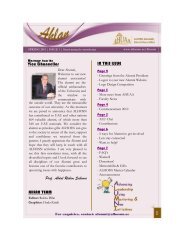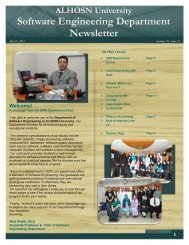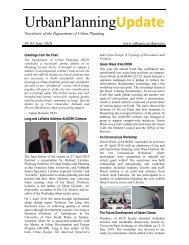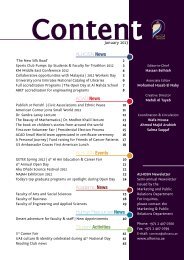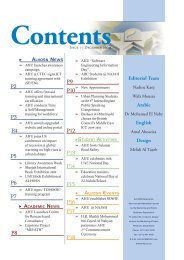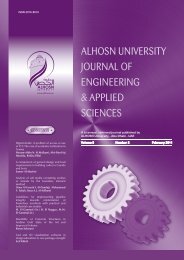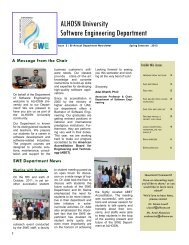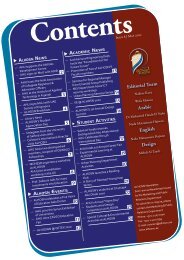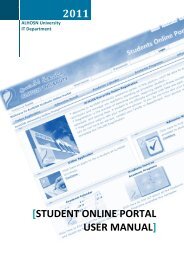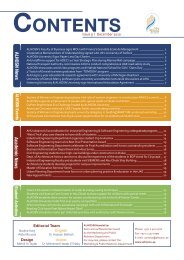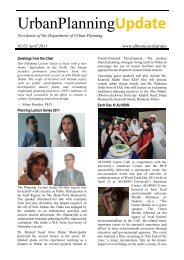ALHOSN University Catalogue Global Knowledge with Local Vision ...
ALHOSN University Catalogue Global Knowledge with Local Vision ...
ALHOSN University Catalogue Global Knowledge with Local Vision ...
You also want an ePaper? Increase the reach of your titles
YUMPU automatically turns print PDFs into web optimized ePapers that Google loves.
Course Descriptions<br />
CIV 301 Soil Mechanics (3 = 2 + 1) (Fall)<br />
Prerequisite: FES 270<br />
This course is concerned <strong>with</strong> the physical and mechanical properties of soils. It includes topics of soil chemistry<br />
and soil fabric, soil classification, compaction, hydraulic conductivity, one-dimensional and two-dimensional<br />
seepage, soil compressibility, time dependent deformation of soils, and shear strength behavior of soils.<br />
Laboratory sessions involve experimentally evaluating the engineering properties of several different soil types and<br />
the application of these results to engineering problems.<br />
CIV 302 Hydraulics (3 = 2 + 1) (Fall)<br />
Prerequisite: FES 240<br />
Fluid mechanics principles are applied to practical hydraulic problems involving flow in closed conduits and in<br />
open channels. Topics in pipe flow include losses in pipes, pipes in series and parallel, and network analysis.<br />
Topics in open channel flow deal <strong>with</strong> classification of flows, open channels and their properties, energy and<br />
momentum principles, uniform flow, design of erodible and non- erodible channels, and gradually varied flow.<br />
These aspects are explained in lectures and validated by laboratory measurements and demonstrations.<br />
CIV 303 Structural Systems I (3 = 2 + 1) (Fall)<br />
Prerequisite: FES 240<br />
The basic principles of statics examined through the application of these principles to simple structural systems.<br />
The external forces that act upon the elements of buildings are identified and their resultant impact on the<br />
structure is examined. This course aims at providing the students <strong>with</strong> the skills and techniques required for the<br />
analysis of statically determinate structures. It includes the discussion and review of basic statics; stability and<br />
determinacy; analysis of determinant structures (trusses, beams, and frames). It also aims to providing<br />
students <strong>with</strong> the techniques required to perform the deflection analysis for structures such as trusses, beams and<br />
frames using the elastic beam theories and the energy approaches.<br />
CIV 304 Mechanics of Structural Materials (3 = 3 + 0) (Fall)<br />
Prerequisite: FES 231<br />
The content is focused on the application of the principles of the mechanics of solids in the design and analysis of<br />
structural materials and components. Building on engineering skills gained in the first two years, the class will<br />
examine general stress analysis, failure criteria, flexure, shear, torsion, and compression buckling and plasticity as<br />
these aspects apply to structural components.<br />
CIV 305 Construction Materials (3 = 2 + 1) (Fall)<br />
Prerequisite: FES 231<br />
The purpose of this class is to provide students <strong>with</strong> knowledge of residential and commercial building<br />
techniques and materials. In it, the properties and applications of common construction materials, components,<br />
and systems that relate to steel and concrete-frame structures are examined.<br />
CIV 306 Introduction to Geology for Engineers (3 = 3 + 0) (Fall)<br />
Prerequisite: FES 270<br />
This class deals <strong>with</strong> the fundamental principles of geology. Topics include mineralogy, rock-forming processes,<br />
weathering, erosion, groundwater, glaciations, mass wasting, running water, deserts, shorelines, geologic structures,<br />
tectonism, and Earth interior. The links between geology, engineering and the environment are explored through case<br />
studies.<br />
CIV 311 Transportation Engineering (3 = 3 + 0) (Spring)<br />
Prerequisite: FES 203<br />
This class commences <strong>with</strong> an introduction to Transportation Engineering context of planning, design and<br />
operations of urban and rural systems. The class also provides an introduction location <strong>with</strong> special emphasis<br />
on Canadian standards and specifications. It also includes detailed study of road design elements, vehicle<br />
motion, pavement interaction, and principles of roadway capacity.<br />
CIV 312 Engineering Hydrology (3 = 3 + 0) (Spring)<br />
Prerequisite: CIV 302<br />
The emphasis in this course is on quantitatively describing the physical processes in the hydrologic cycle. Such<br />
processes include precipitation, evaporation, evapotranspiration, infiltration, groundwater flow, surface runoff, as<br />
well as channel and reservoir routing effects. Specific reference will be made to hydrological processes in arid<br />
zones. Hydrologic design approaches in connection <strong>with</strong> civil engineering disciplines and statistics applications to<br />
hydrologic design problems are also discussed.<br />
98



